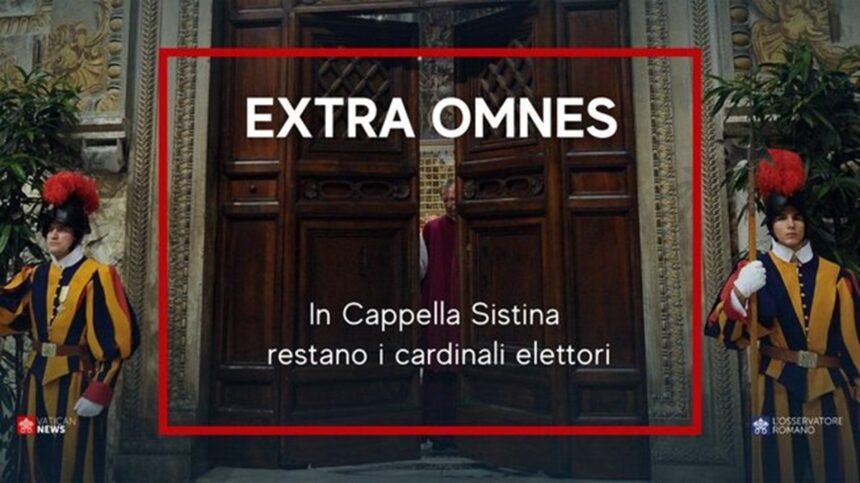In an awe-filled silence, deep within the heart of Vatican City, something ancient stirs. Cloaked in secrecy and sacred tradition, the cardinals of the Catholic Church have once again secluded themselves inside the Sistine Chapel—the most iconic sacred space on earth—to elect a new Supreme Pontiff.
But this is no ordinary conclave.
Across the globe, speculation swirls with urgency: Is this the election of Peter the Roman—the final pope foretold in prophecy—who will witness the fall of the Vatican and the end of the Roman Church as we know it?
A Sacred Lockdown: When the World Holds Its Breath
The moment the doors close behind the cardinals, the world enters a moment suspended in time. This isn’t just political theatre—it is spiritual warfare, divine mystery, and ancient prophecy unfolding in real time.
“Extra omnes!”—Everyone out!—is the phrase that seals the doors of the Sistine Chapel. From that point forward, no one may enter or exit. The red-robed princes of the Church are alone, locked away not just from the outside world, but from themselves—called to abandon personal ambitions and surrender to the will of the Holy Spirit.
This is no mere tradition. It is a ritual of profound humility, an echo of the paradox Jesus taught: “He who wishes to be first among you must be the servant of all.” (Mark 10:44)
The Mystery of Peter: Why the Papacy Is a Paradox
Whoever is elected will not just inherit a title. He becomes servus servorum Dei—the servant of the servants of God. In a world intoxicated by power, this is a contradiction that bewilders media pundits and political analysts alike.
How can the most powerful religious leader on Earth be a slave?
This is the paradox of Peter. He was not chosen because he was perfect—but because he was humble, broken, forgiven. Peter, who once denied Christ three times, was the same man to whom Jesus said, “You are the rock, and on this rock I will build my Church, and the gates of hell shall not prevail against it.” (Matthew 16:18)
Peter the Roman: Fulfillment of Prophecy or The Beginning of the End?
For those who study Catholic prophecy, the name “Peter the Roman” is more than symbolic. According to the controversial Prophecy of the Popes, attributed to Saint Malachy, Peter the Roman will be the final pontiff—ushering in judgment and the destruction of the city of seven hills.
While the Church does not officially endorse the prophecy, its eerie accuracy up to recent popes has kept it alive in Catholic imagination. Could the next pope really be the one to lead the faithful through the Church’s final chapter?
The Weight of the Cross: More Than a Leader, a Living Sacrifice
The papacy is not a crown of gold, but a cross of wood.
To ascend the throne of Peter is to carry the burden of a billion souls. It is to stand at the crossroads of history, where faith and doubt collide, where the Church is both persecuted and praised, fragmented and yet universal.
As Jesus told Peter before his own martyrdom: “Satan has asked to sift you like wheat. But I have prayed for you, Simon, that your faith may not fail. And when you have turned back, strengthen your brothers.” (Luke 22:31–32)
This is why the cardinals must not merely elect a man—they must discern the soul who can become a shepherd after God’s own heart. One who will lead not by command, but by tears, prayer, and the strength born of surrender.
In the Shadow of the Frescoes: A Church at the Crossroads
Under Michelangelo’s masterpiece—the ceiling that tells the story of creation and the Last Judgment—each cardinal kneels, voting in silence, their choice whispered in Latin.
They know what is at stake. The Church is standing on the threshold of a new era. Divided by scandals, wounded by secularism, challenged by war, consumerism, and indifference, she cries out not for power—but for purification.
And so, the electors must die to self. Not metaphorically, but spiritually. In choosing a pope, they must choose someone willing to become a victim of love, a bridge between heaven and earth, a man who has walked through the fire of failure and emerged sanctified by mercy.
The Fisherman’s Tears: Why Peter Still Matters
The strength of the Church has never come from marble basilicas or Vatican gold. It has always flowed from the tears of a forgiven fisherman.
Peter’s denial—and his return—reveals the soul of the Church: fallible, fragile, and yet fiercely faithful. His bitter weeping was not the end—it was the beginning. Unlike Judas, who despaired, Peter wept with contrition, and in those tears, Christ gave him the keys to the Kingdom.
Those keys—though tarnished by centuries of crisis and corruption—still unlock the mystery of mercy. That is why Peter remains the rock. Not because he was strong, but because he knew he wasn’t—and trusted Jesus anyway.
Awaiting White Smoke: A World Watching, Praying, Wondering
As the chimney is readied atop the Sistine Chapel, all eyes turn to the sky. Will the smoke be black—or white? Will the next pontiff emerge with a name that echoes history, or one that signals a new beginning?
Will he be the last?
Only heaven knows. But one thing is certain: the Church does not survive by strategy, media campaigns, or popularity polls. She survives because Christ prayed that Peter’s faith would not fail. And 2,000 years later, that prayer is still being answered—one pope at a time.

















